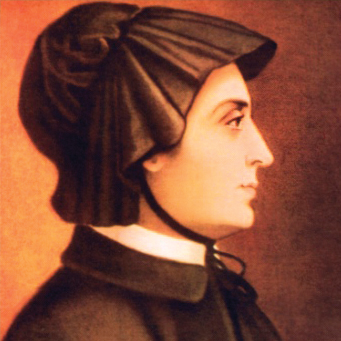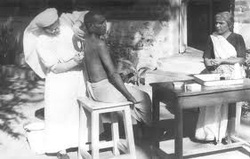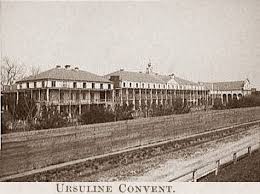It is the very nature of love to make us seek the presence of the person we love, and to delight in their company and conversation. Elizabeth Ann Bayley Seton
We have spent the last few months on a journey through the Middle Ages looking at the lives of Christian Women Mystics. It is time to turn to the stories of many other saints in other times in the history of the church.
Th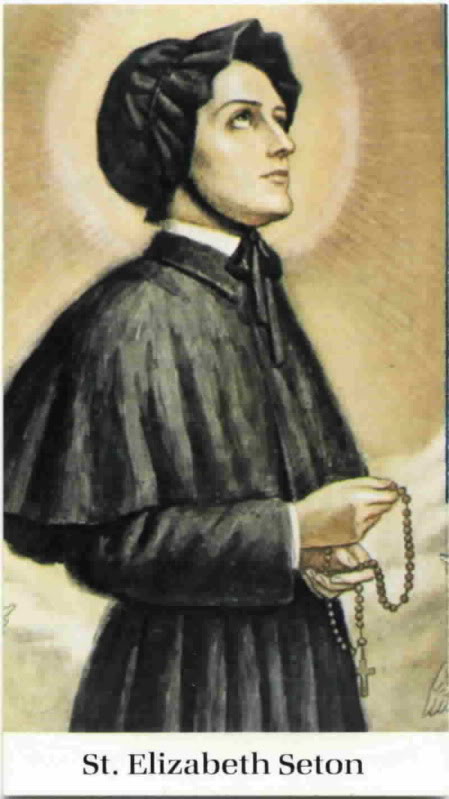 is week I would like to share some writings of Elizabeth Ann Seton. Though “Mother” Seton lived well after the Middle ages, (she was born in 1774 and died in 1821), her writings show a strong desire to have union with Christ and therefore we can place Elizabeth Seton among the Christian Mystic saints. Mother Seton comforted many thousands of Christians who looked to her as an inspiration in contemplating Christ. Her closeness and utter dependence on Christ place her among mystic saints. Mother Seton said, “This union of my soul with God is my wealth in poverty and joy in deepest affliction.” Elizabeth was so completely aware of God’s presence at all times that she inspired everyone around her.
is week I would like to share some writings of Elizabeth Ann Seton. Though “Mother” Seton lived well after the Middle ages, (she was born in 1774 and died in 1821), her writings show a strong desire to have union with Christ and therefore we can place Elizabeth Seton among the Christian Mystic saints. Mother Seton comforted many thousands of Christians who looked to her as an inspiration in contemplating Christ. Her closeness and utter dependence on Christ place her among mystic saints. Mother Seton said, “This union of my soul with God is my wealth in poverty and joy in deepest affliction.” Elizabeth was so completely aware of God’s presence at all times that she inspired everyone around her.
I have already done a post on Mother Seton (August 3, 2015). There you will find the details of her life – her happy marriage, motherhood, and the founding of the American order of the Sisters of Charity. You will also see the tragedies she suffered – the deaths of her mother at an early age, her father, her husband, and her two daughters. Through all of life Elizabeth trusted and depended on God. She never let troubles get her down. Through all heartaches, deaths of loved ones, poverty, and the many challenges as she started her charitable work she turned to God Who did not let her down but provided for her and often in unexpected ways.
Elizabeth was raised as an Episcopalian. After her husband’s tragic early death, she was introduced to Catholicism by her husband’s Catholic relatives. Elizabeth was also influenced by Abbe Louis William Valentine Dubourg, a member of the Sulpician Fathers. The Sulpicians went to North America around 1800 as refugees escaping from the Reign of Terror that occurred in France in the 1790’s. Elizabeth was inspired by the goals of the Sulpicians to start religious schools in North America. She longed to start a school for the poor also.
Elizabeth’s love for Christ and for the poor was all that mattered to her. Founding a religious order similar to other Catholic Religious orders was the method she chose to fulfill her dream of free education for the poor. She joined the Catholic church and began her order with just a few sisters. The American Sisters of Charity adopted the rules written by St. Vincent de Paul for the Daughters of Charity in France. (See related post on Louise de Marillac, November 15, 2016.)
After founding the Sisters of Charity, Elizabeth worked tirelessly for twenty years and then slowly and painfully succumbed to tuberculosis. On her deathbed she offered prayers for the sick and dying. She was unselfish in her devotion to Christ and others right up to the end of her life. She died surrounded by Sisters on January 4, 1821.
At the time of her death there were more than twenty communities of Sisters of Charity. The sisters opened schools, built orphanages, boarding schools, and hospitals in 8 states and the District of Columbia.
During Elizabeth’s final years she spent much time ministering to the elderly. Because of her vibrant faith and anticipation of life in Heaven after death, she was able to comfort many who were dying. Here is something she shared with one friend who was at death’s door, “In the course of the day, while you work or pray, sometimes think: “Oh, how happy I am! Jesus, my dear Jesus, is coming to me. Oh, dearest Lord, prepare me for Yourself.”
Following are quotes from her many letters to family and friends (Taken from “The Collected Writings of Elizabeth Ann Bayley Seton”.)
“What was the first rule of our dear Savior’s life? You know if was to do his Father’s will. 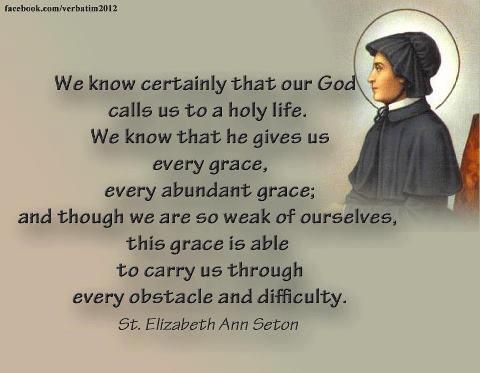 Well, then, the first purpose of our daily work is to do the will of God; secondly, to do it in the manner he wills; and thirdly, to do it because it is his will. We know certainly that our God calls us to a holy life. We know that he gives us every grace, every abundant grace; and though we are so weak of ourselves, this grace is able to carry us through every obstacle and difficulty.”
Well, then, the first purpose of our daily work is to do the will of God; secondly, to do it in the manner he wills; and thirdly, to do it because it is his will. We know certainly that our God calls us to a holy life. We know that he gives us every grace, every abundant grace; and though we are so weak of ourselves, this grace is able to carry us through every obstacle and difficulty.”
“Faith lifts the soul, Hope supports it, Experience says it must and Love says … let it be!”
“The gate of heaven is very low; only the humble can enter it.”
From a letter to Cecilia, October 7, 1805 – “and in every disappointment great or small let your dear heart fly direct to Him your dear Saviour throwing yourself in his arms for refuge against every pain and sorrow ‘He will never leave you nor forsake you.’”
“We must pray literally -without ceasing – in every occurrence and employment of our lives – that prayer of the heart which is independent of place or situation, or which is rather a habit of lifting up the heart to God as in a constant communication with Him.
“The accidents of life separate us from our dearest friends, but let us not despair. God is like a looking glass in which souls see each other. The more we are united to Him by love, the nearer we are to those who belong to Him.”
“Our God loves us; this is our comfort.”
“He gives us every grace … this grace is able to carry us through every obstacle and difficulty.”
“How liable we are to err in our judgments respecting others, unless we thoroughly know the motives of their actions.”
“Trust all, indeed, to Him my dear one; put all in His hands…”
“Cheerfulness prepares a glorious mind for all the noblest acts.”
“Live simply so that others may simply live.”
“Blessed, blessed Lord, keep us always in your company and press our weak hearts forever in your service.”
“Oh my God, forgive what I have been, correct what I am, and direct what I shall be.”
“Without prayer I should be of little service.”
And last, but not least, a prayer we all should say every day:
“How gracious is the Lord who strengthens my poor soul!”
